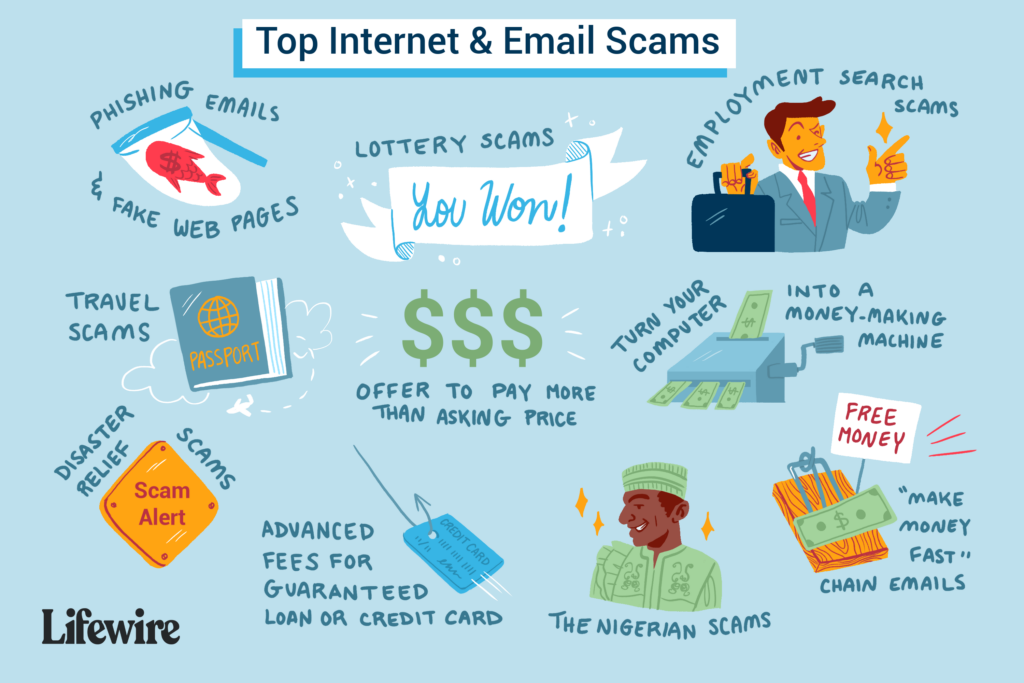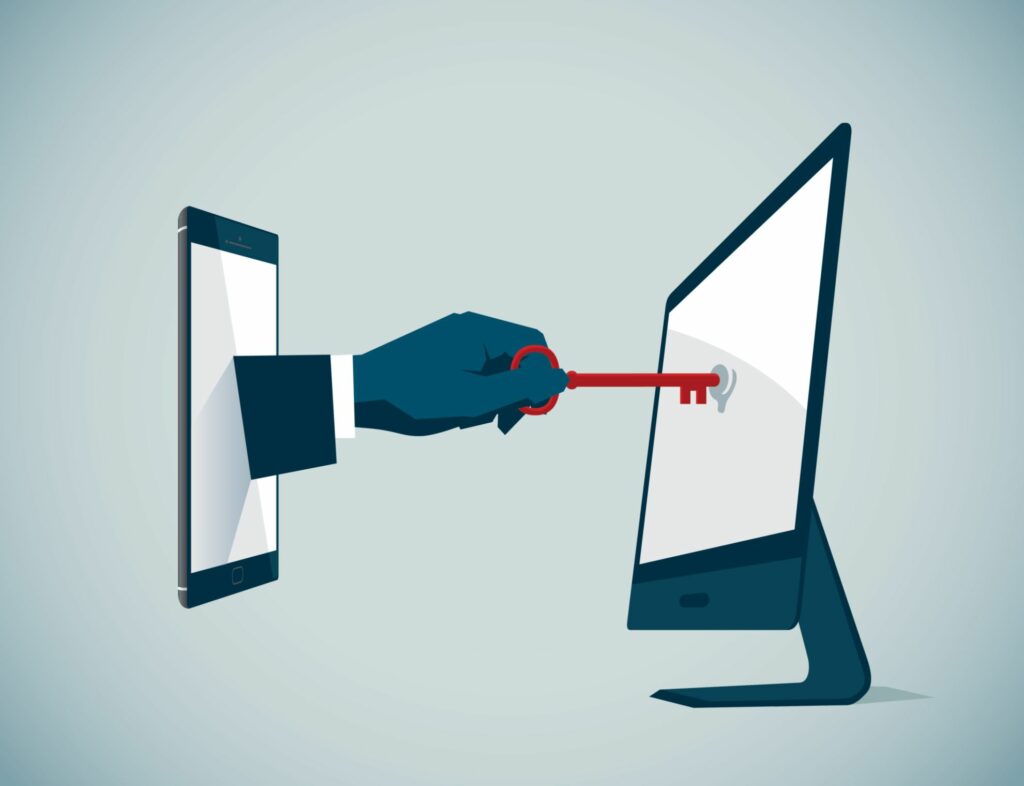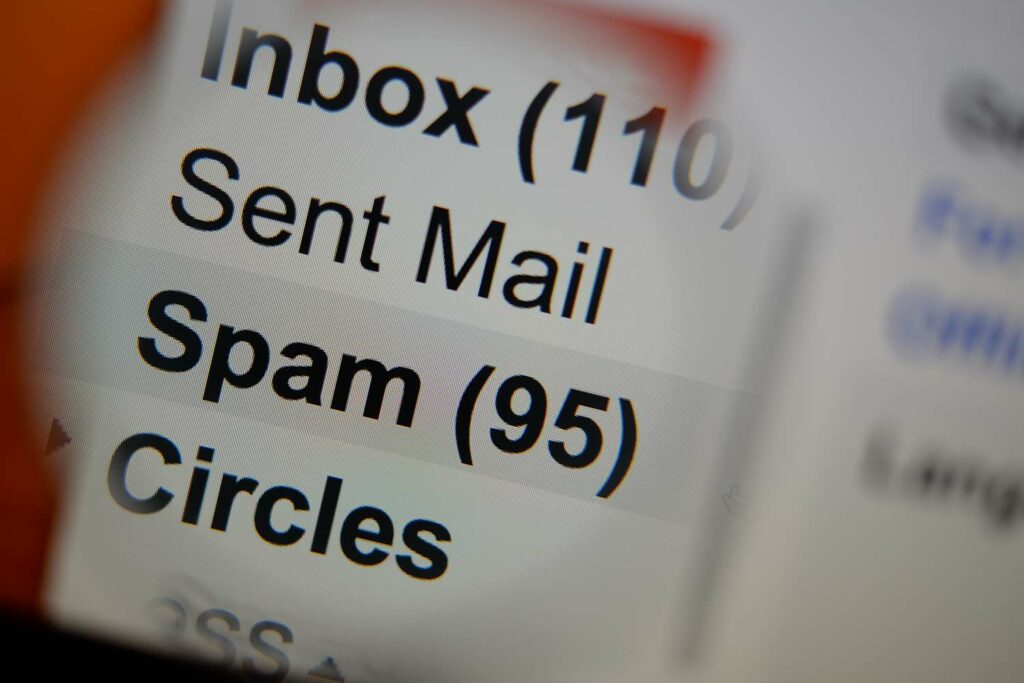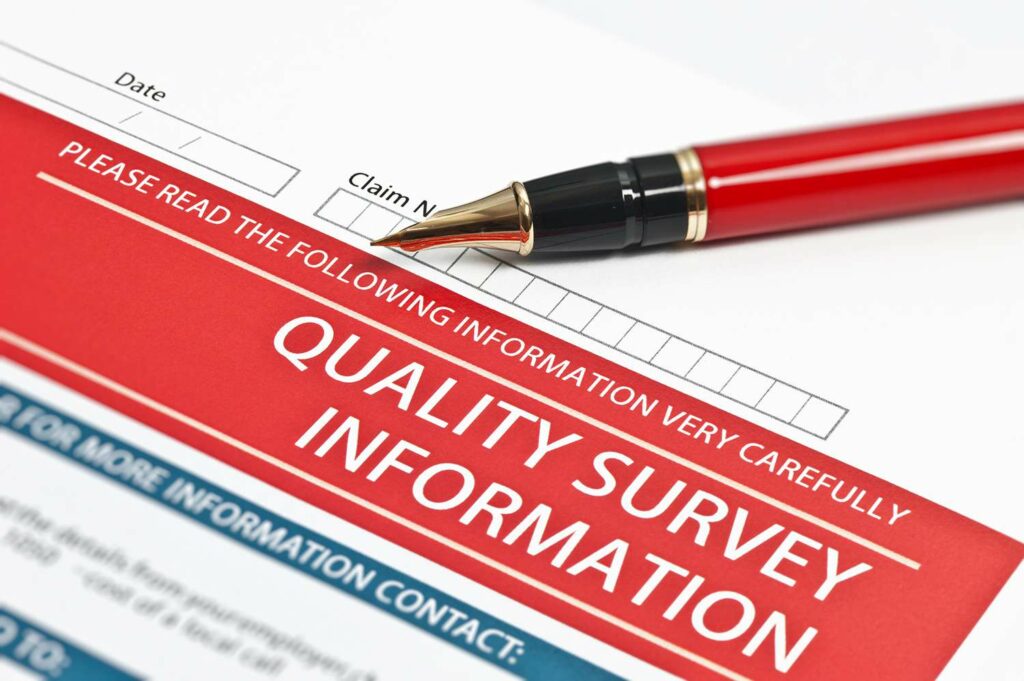Internet scams are nearly as old as the internet itself, and many have roots in cons that existed long before the World Wide Web. Email is the delivery method of choice for many of these scams, which trick unsuspecting users into giving up valuable data and even money.
Awareness is key to recognizing and avoiding email scams. Here’s a look at the 10 most common email scams, including what to look for and how to protect yourself.
Email scams are constantly evolving. This list gives an overview of common scams but doesn’t cover every con you might encounter. Learn to recognize the signs of fraudulent emails and always err on the side of caution.
Table of Contents
1. Phishing Email Scams
erhui1979 / Getty Images
Phishing scams are common and widespread internet cons. Phishing emails lure unsuspecting users into divulging login credentials (usernames and passwords) by mimicking legitimate correspondence from companies such as Citibank, eBay, or PayPal.
A phishing email will warn that your account might be compromised, or that you need to verify your personal information or reset a password. The email always tells you to click a link to solve the problem.
The provided link will deliver you to a phony web page, which will prompt you to enter your ID, password, and other personal information. The scammers will use this information to access your real account.
In such scenarios, there’s a considerable likelihood that your private details might end up as stolen data. Grasping the techniques cyber felons utilize to illicitly acquire your confidential information is imperative.
Familiarizing oneself with the diverse strategies these fraudsters use can shed light on safeguarding your digital identity. Recognizing the ease with which your personal information can be siphoned off and misused is key, as it may result in jeopardizing your online integrity and financial stability.
To avoid being a phishing victim, always be wary of links in emails. Many of these emails seem legit at first glance but look closely at the sender’s email address. Is it from the institution, or does it look random? Look at the URL of the provided link. Does it begin with https://? Legitimate sites that ask for your login details will use HTTPS.
If you have doubts, contact the company to verify if the email is real. Get in the habit of not clicking on any links in emails. Type the links manually. For example, if you get an email that appears to be from your bank, but you’re not sure, open your bank’s website in a browser and log in.
In the shadowy world of cybercrime, superior phishing emails have become frighteningly sophisticated, using psychological manipulation and advanced technological tricks that can fool even the most tech-savvy individuals.
These digital predators now craft messages so precise and contextually believable that they can mimic everything from corporate communication styles to personalized urgent alerts that trigger immediate emotional responses.
2. Nigerian Email Scams
Gil-Design / Getty Images
The Nigerian email scam is a classic con. You’ll receive an email from an alleged member of a wealthy Nigerian family. They desperately need help getting an enormous sum of money out of the country. All you need to do is cover the endless legal expenses and other fees that must be paid to the authorities to release the fictional fortune. Once you’ve freed up the money for them, they promise to give you a cut.
This scam dates back to the 1920s when it was known as the Spanish Prisoner con. It’s still in use today because it preys on people’s emotions and willingness to help. If you see an email like this, delete it.
3. Ticket Email Scams
Tetra Images / Getty Images
Ticket scams are another popular type of email and online fraud. In 2018, the Better Business Bureau received nearly 400 complaints of this type. The scammers trick people into buying fake tickets to a sporting event or concert through a shady online marketplace or reseller. You might receive an email advertising hard-to-get tickets for high-profile events, such as the Super Bowl or the Stanley Cup playoffs, and then click through to the fake seller.
To avoid falling victim to this fraud, buy tickets only from trustworthy sources. Purchase tickets directly from the venue whenever possible. Use a payment method that comes with protection, such as a credit card. Check out the seller on bbb.org or its partner NATB (The National Association of Ticket Brokers) if you’re unsure about its credibility.
4. Credit Card Email Scams
krisanapong detraphiphat / Getty Images
There are many types of credit card email scams. If you get an email or mail offer for a pre-approved loan or credit card that charges an upfront fee, beware. Reputable credit card companies may charge an annual fee, but it’s never upfront. Scammers might also offer lower rates or higher credit limits, which can be tempting for people who have trouble qualifying for accounts.
Scammers might also email you purporting to be from your credit card company. They’ll offer a better interest rate, say they’re sending you a new card, or direct you to verify your personal information.
To avoid credit card scams, check directly with the bank or credit card issuer. Never pay an upfront fee for a credit card or loan. If you want to apply for a line of credit, go directly to a reputable company’s website to fill out an application.
Consider using a secure credit card for added protection. A secure credit card requires a cash deposit that serves as collateral and determines your credit limit. This deposit minimizes the risk for the issuer and can make it easier to obtain for individuals with limited or poor credit history. Opting for a secure can be a strategic move towards financial stability.
Not only does it safeguard your transactions, but it also establishes a solid credit foundation. You’ll likely see a gradual improvement in your credit scores. Moreover, the initial deposit for a secure card is within reach for many, making it an accessible option for starting or mending credit. Over time, responsible use of a secure credit card may lead to opportunities for higher credit limits.
5. Lottery and Sweepstakes Email Scams
Adam Gault / Getty Images
Lottery scams are common, as are sweepstakes and other prize scams. These cons lead you to believe you’ve won a large amount of money. You’ll receive what looks like an official email from a lottery organization, either from the U.S. or a foreign country. The “lottery officials” want your personal information so they can send out your winnings. In reality, this is nothing more than a phishing attempt that can potentially leave you with a stolen identity or depleted bank account.
The best way to avoid this scam is to ignore it. If you didn’t enter a lottery, you didn’t win a lottery.
6. Employment Email Scams
mediaphotos / Getty Images
You posted your resume on a legitimate employment site, including some personal data. You receive an emailed job offer to become a financial representative of an overseas company you never heard of before. The company says it wants to hire you because it has problems accepting money from U.S. customers, and it needs you to handle those payments. You’ll get a commission per transaction. But, they need you to give them some personal data, such as your bank account information, to pay you.
Instead, you wind up with a stolen identity, an empty bank account, and fake checks and money orders. Variations on this scheme include charges for training and expensive equipment. The company might also “accidentally” overpay you by check and ask for a reimbursement.
Like many scams on this list, a healthy dose of skepticism can prevent you from falling victim. Ignore these too-good-to-be-true job offers. If they arrive via email, delete them.
7. Disaster Relief Email Scams
CapturedNuance / Getty Images
What do 9-11, the Tohoku earthquake and tsunami, and Hurricane Katrina have in common? These are disasters in which people died or lost everything. In times like these, good people pull together to help the survivors, often using online donation portals and email requests. Unfortunately, scammers are doing the same thing, setting up fake charity websites to steal money intended for victims, and spreading the word via email and social media.
If you receive a donation request in your email, there’s a chance it’s a phishing attempt. Don’t click any links in the email or provide any bank account or credit card information. Another sign a charity email is fake is if it asks for donations in cash, gift cards, or money transfers.
To avoid this scam and still help those in need, contact recognized charitable organizations directly by phone or through their websites. Always research a charity using tools like Charity Navigator before handing over any money.
8. Travel Email Scams
gopixa / Getty Images
Travel-related scams are most active during the summer months. You receive an email with an offer to get amazingly low fares to some exotic destination, but you must book it immediately or the offer expires.
If you call, you’ll find out the travel is free, but the hotel rates are overpriced. Some offer you rock-bottom prices but hide high fees until you sign on the dotted line. Others make you sit through a timeshare pitch at the destination. Many will take your money and deliver nothing. Getting a refund, should you decide to cancel, is usually impossible.
Book your trip through a reputable travel agency, or online service (for example, Travelocity and Expedia), to avoid this type of fraud.
9. Survey Email Scams
teekid / Getty Images
Someone sends you a survey about an issue you’re passionate about, such as global warming or gun control. But, you never specifically requested to partake in a survey or join the survey’s mailing list.
That email is likely spam. When you click the link to take the survey, malicious software such as spyware or malware is installed on your PC, leaving your personal information vulnerable to hackers.
Other survey scams ask you to pay money upfront before compensating you for your input. But the money they offer is less than what you paid (or they just take your cash and run).
Avoid these types of scams by ignoring the email or conducting research before participating. Check if the survey company has a privacy policy. If you can’t find one, assume it’s a fraud. Online survey communities like Survey Police can help determine if an email is legitimate.
10. Ransomware Email Scams
geralt / Creative Commons CCO / Pixabay
This type of phishing scam tricks you into installing ransomware on your computer, which then hijacks your files. The hacker says they’ll give you access if you pay them, but there’s no guarantee they’ll unlock them once they have your money. Some ransomware scams make you believe they hacked your computer even if they didn’t.
To avoid ransomware scams, don’t click links in emails you don’t trust, and never run executable files in email links. Also, download a good anti-malware program and keep it updated.










